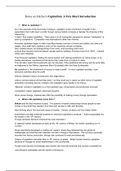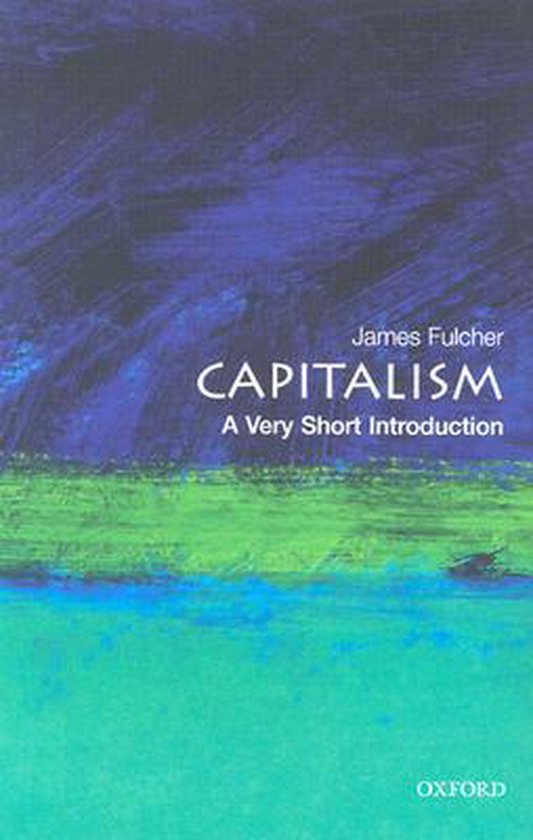Notes on Fulcher’s Capitalism: A Very Short Introduction
1. What is capitalism ?
As in the example of the East India Company, capitalism is the investment of wealth in the
expectation that it will return a profit, though various factors increase or hamper the chances of this
happening.
It wasn’t free market capitalism. There were a lot of monopolies designed to prevent “interlopers” or
start-up competitors. Competition was international rather than internal.
Industrial capitalism began in mills (near Manchester) and led to Unions and battles over time and
wages, since staff were needed to work on the machines almost constantly.
Also created leisure, by distinguishing it from work, and bounding work hours.
Leisure then became commercialised: people paid for holidays (Thomas Cook from 1841). Created
whole new industries.
Then financial capitalism; trading the stock-market, and making predictions on future prices, or by
trading derivatives, mechanisms that derive their value from a product or stock.
This can also mean that investments are not returned, if the predictions are wrong and the price falls,
as happened to the Nikkei (Japanese Stock Exchange) after the Kobe Earthquake.
So capitalism is ‘the investment of money to make a profit.’ In most capitalist societies, most
economic activities allow for profit.
Division between means of production and wage labour.
Labour cannot produce all that they need – so they must buy it; opens up other forms of capitalist
production (including leisure); explains why capitalism grew rapidly in its infancy.
“Markets” central to capitalism in a more abstract way: consumption and production divorced.
Competition makes capitalism extremely dynamic.
Since prices change, markets also offer the possibility of making money through speculation.
2. Where did capitalism come from ?
Britain was the first industrial society. The spread of market relationships forced people to earn
money to buy what they needed; thus they took up jobs in mills and factories.
Also thinking about ‘the economic basis of society.’ Division of labour etc from Adam Smith.
Imperialism provided protected markets for merchant capitalism’s products – India incorporated into
the empire in the 18th century.
Though domestic demand remained the most important !
A ‘national market’ developed as early as the 16th century in Britain, for traders operating out of
London.
Some merchants developed a ‘putting-out’ system; where they delivered the raw goods to
craftspeople and sold the final materials, but didn’t change it themselves. This process eventually
moulded into factory production, though also continued to exist simultaneously.
Origins of capitalism traceable then to 16th century or earlier. Britain tended towards capitalism
because of changes to social relationships in the countryside.
Feudal lords became increasingly land owners who lived off tenancies that workers competed for.
Land became marketable with the advent of enclosure.
, Black Death made labourers scarce and more valuable / important / entitled. Also, feudalism had
never taken hold due to a cohesive monarchy in the way it had elsewhere in Europe. Centralised
state also helped with national market.
Many other examples in Europe however; often interlinked. English wool being imported by Flanders
weavers.
Then in mining, since deeper mines (after shallow deposits had been exhausted) required more
capital than the workers had, so required investors.
England also benefitted from its openness to refugees – Huguenots, Jews etc.
Business was European in scope, with Italian merchants having branches abroad, for example, and
even financing the military adventures of English kings.
Only in 18th century that Britain overtook Holland as most capitalist country in Europe.
Europe the origin of capitalism because of :
Financially-minded city-states. Though cities lost their autonomy and countryside has played a big
role in development of capitalism.
Feudalism – often the opposite of capitalism; forced to produce a surplus for lord, and had specified
obligations laid out by him.
Market economy transition easy.
No one ruler held all of Europe – could move to favourable enterprising conditions in other countries.
3. How did we get here ?
Anarchic capitalism – industrial capitalism in 18th / 19th centuries that was unchecked by organised
labour or the state; unregulated, exploitative.
Labour mobile, building cities etc and huge competition between factories and workshops.
Unions largely short-lived, unsuccessful.
In 1802 – Health and Morals of Apprentices Act regulated hours children could work. The 1833
Factory Act was the first effective legislation.
Generally though, state set about deregulation of national, then international commerce, due in part to
liberal beliefs and free-market economic ideas.
Workhouses introduced in 1834 Poor Law Amendment Act to get those suffering under capitalism to
work, rather than be a burden on the community.
Managed capitalism between 19th century and 1970s – competition and regulation declined, larger
units of production through mergers (buying up competition).
Companies now required management – a new type of job available; shareholders weren’t
necessarily rich people, only owned small stakes, so the managers began controlling enterprises
(managers still had little power).
Class relationships also managed; working classes represented – voting rights in 1867.
Welfare increasing too – public health measures from mid-19th century. Took until 1900s for the first
welfare state to be introduced. 1940s saw its completion – free secondary education, NHS.
Employment crucial to welfare, so full employment became top priority.
Change came in early 1900s due to poor physical health of soldiers in Boer War, and the better
welfare state of imperial Germany.
Empire then important for managed capitalism – also led to protectionism, markets being protected
and supply of cheap raw materials maintained.
1940s the last big burst of nationalisation.





